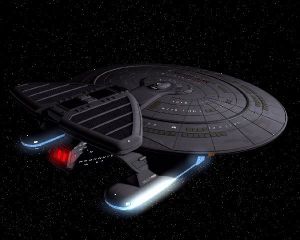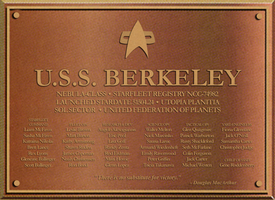USS Berkeley
From Starbase 900 Wiki
| Name | USS Berkeley |
| Image | 
|
| Class | Nebula |
| Registry | NCC-74982 |
The U.S.S. Berkeley, registration NCC-74982, is a Nebula Class starship that has been decommissioned. Most of the crew of the Berkeley were transferred to Starbase 900 under the command of Admiral Ricky Wegener.
History of the U.S.S. Berkeley
The original USS Berkeley (DDG-15) was a Charles F. Adams-class guided missile destroyer in the United States Navy. She was the first ship of the American fleet to be named in honor of Major General Randolph C. Berkeley, USMC. General Berkeley was awarded the nation's highest decoration, the Medal of Honor, for distinguished service during the Battle of Veracruz, Mexico in April 1914. She was laid down by the New York Shipbuilding Corporation at Camden in New Jersey on 1 June 1960, launched on 29 July 1961 sponsored by Mrs. James B. Berkeley, Major General Berkeley’s daughter-in-law; and commissioned on 15 December 1962 at the Philadelphia Naval Shipyard, Commander Wyatt E. Harper in command.
After thirty-two years of service to the United States Navy, the Berkeley was decommissioned on 30 September 1992 at a ceremony in San Diego, California, and stricken from the Naval Vessel Register. She was turned over to the Hellenic Navy on 1 October, and recommissioned as HHMS Themistocles (D-221). The ship remained in Greek service until her decommissioning on 18 February 2002 and was sold for scrap in 2004.
Another Berkeley would not be commissioned until the late 24th century with the starship USS Berkeley NCC - 74982, a Nebula class explorer, constructed at Utopia Planitia shipyards, Mars.
The Nebula class was developed along-side the Galaxy class in the 2340s and ‘50s. While Starfleet firmly believed in the feasibility of the Galaxy class, they wanted a more cost-effective ship that would be able to perform much of the same missions as the larger, more expensive capital ships under construction.
Part of the design that was approved by Starfleet included a multi-mission module that could easily be exchanged within days at a certified facility. The first of which consisted of a sensor dome attached to the rear of the ship. Designed to aid in long-range reconnaissance and search-and-rescue operations, the sensor pod quickly proved its usefulness, so much so that several Nebula class vessels were allocated to border patrols.
With the flexibility given to it by the replaceable pod-module, the Nebula class has quickly become one of the most produced and utilized starships of the 24th century.
